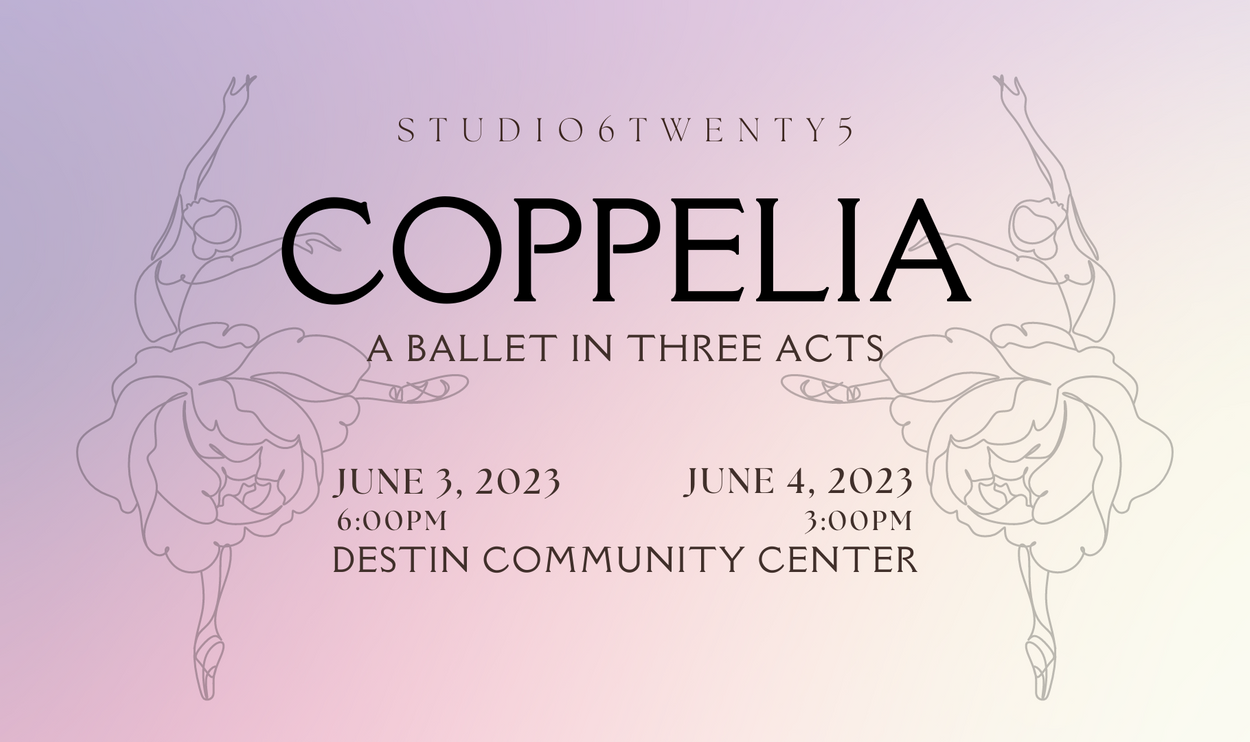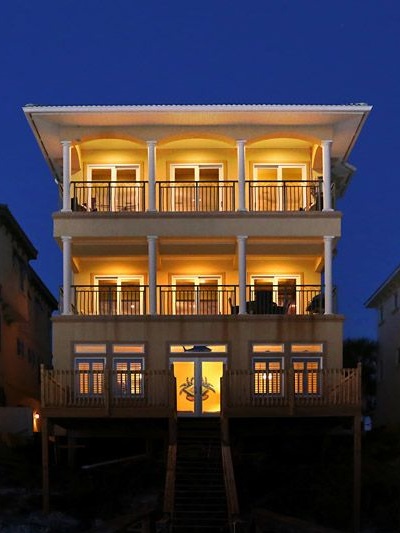Please join us! studio6twenty5 proudly presents Coppélia, A ballet in three acts. Featuring the studio6twenty5 Children’s Program, as well as Adult/Open Division dancers.
Date: Saturday, June 3, 2023 – Doors open at 5:00 p.m., Showtime at 6:00 p.m.
Date: Sunday, June 4, 2023 – Doors open at 2:00 p.m., Showtime at 3:00 p.m.
Place: Destin Community Center – 101 Stahlman Ave, Destin, FL
Tickets can be purchased at EventBrite.
Staging, arrangement and choreography by artistic director Rachel Prescott.
With original choreography by Shaye Smith.
100% of performance proceeds directly benefit the studio6twenty5 Children’s Program.
Donation opportunity available upon check-in.
“Just as Giselle is ballet’s great tragedy, so Coppélia is its great comedy.” – George Balanchine on the importance of Coppélia
Our story takes place in a small village of Galicia, a province of Austria-Hungary, with today’s map finding Galicia in western Ukraine and southeastern Poland. The “color” of the region can be seen in the brilliant colors, heavy embroidery and elaborate trimmings of the costumes. It can also be heard in the rich nationalistic melodies and complex folk dances of the composer. This was the first use of the Hungarian czardas to be performed in a ballet, which is a very complex national dance; both the czardas and mazurka dances in Coppélia were the culmination of the region’s folk dances.
At the age of 33, Delibes was commissioned by the Paris Opera to write his two large‑scale ballets, Coppélia and Sylvia. Coppélia is based on a story by E. T. A. Hoffmann – the same tale that sparked Offenbach’s brilliant “Doll Act” in his opera, The Tales of Hoffmann.
It is thought that the third act score of Coppélia was the model for “Aurora’s Wedding,” the third act of Tchaikovsky’s The Sleeping Beauty. Tchaikovsky was a great admirer of Delibes, and there is evidence that Tchaikovsky himself also felt the score of Coppélia was superior to that of Swan Lake, a matter for historic interpretation and personal preference.
“Delibes is the first ballet composer, Tchaikovsky and Stravinsky are his successors.” – George Balanchine
Premiering on May 25, 1870 at the Theatre Imperial de l’Opera in Paris, this story is a delightful tale of fantasy with a happily-ever-after ending for Swanhilda, a young village girl who becomes fascinated by the eccentric Dr. Coppélius and his unresponsive “daughter,” Coppélia.
Act I – A village Square in Galicia
The curtain rises on the village and a lovely young girl, Coppélia, is seen sitting on a balcony reading a book as Swanhilda enters. Swanhilda looks up at the girl, tries to attract her attention, but receives no reply. The villagers are preparing for the Harvest Festival. The official party, led by the Bürgermeister, commences the celebration with the ringing of the bells. The celebration is momentarily interrupted by Dr Coppélius, whose mysterious “daughter” causes a quarrel of confusion. The villagers, after continuing the celebrations with a mazurka, disperse among a thunderstorm and await the Harvest Festival to resume the following morning. Meanwhile, Swanhilda and her friends investigate the strange house of Dr Coppélius.
Act II – Inside Dr Coppélius’ house and workshop – that evening
The curtain rises on the dimly‑lit interior of Dr. Coppélius’ workshopshop ‑ a room full of life‑like, life‑size dolls. Swanhilda’s friend pokes her head into an alcove to discover Coppélia. The amazed young intruders wind up all the dolls, who dance as the friends watch, enchanted. Suddenly, a furious Dr. Coppélius enters and all of the culprits flee, except for Swanhilda, who runs into the alcove where Coppélia is kept and puts on her dress. Dr Coppélius is fooled by Swanhilda and thinks his mechanical doll has come to life. When Swanhilda reveals she has changed places with the doll, Dr Coppélius is left broken-hearted and angry.
Act III – The Harvest Festival – the next morning
The storm has cleared and the celebration has resumed. The gathered villagers celebrate the pageant day with joyous dancing. Dr. Coppélius storms in, accusing Swanhilda of destroying his life’s work. Realizing his anger she tells the Bürgermeister her harrowing story, who then takes matters into his own hands buy giving Dr. Coppélius a bag of gold. The Bürgermeister then send him off. All is well in Galacia, and the villagers honor Swanhilda for her honesty and wit. The Harvest Festival continues as the villagers celebrate the hours of the day. They all dance into the night.


